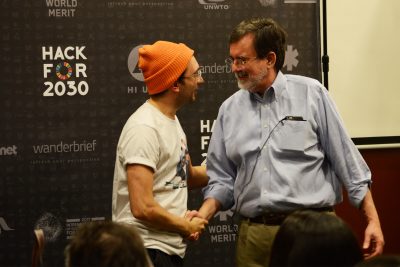
Hostelling International Boston hosted “Hack For 2030: The Final Presentations,” the world’s first sustainable hackathon inside a hostel on Sunday. For five days, hackers and global change-makers joined together to create and design social enterprises to address the United Nation Sustainable Development Goals, a UN initiative dedicated to “promoting and coordinating implementation of internationally agreed development goals,” according to the Sustainable Development Knowledge Platform website.
Attendees came to the hotel to view the final presentations of the competition. The hackathon was a collaboration of three different organizations — Hostelling International USA, World Merit and Wanderbrief — all connected through travel and social action.
HI Boston not only hosts visitors from over 100 countries, but is also a “green building,” one of the most sustainable hostels in the world, making it a natural pick to host “Hack for 2030,” according to Netanya Trimboli, director of communications and PR for Hostelling International USA.
“We are a nonprofit with the purpose of creating a more tolerant world,” Trimboli said. “We bring people from different backgrounds together in these hostels and create experiences where they get to know each other and break down cultural barriers.”
Hostelling International USA is a network of hostels committed to sustainability and breaking down cultural barriers. World Merit is an organization that incentivizes social action by rewarding their members, called “changemakers,” with opportunities and events. Wanderbrief is a platform that connects creative freelancers, whom Wanderbrief calls “creatives,” with companies abroad, trading their skills for travel costs and experience.
The projects participants worked to develop were created in August at World Merit’s event, Merit360. According to its website, individuals ages 18-35 were invited to develop a strategy to “lead and inspire a global community to take action and create change.”
“It’s where we bring 360 people together to work on projects to tackle the United Nations Sustainable Development Goals,” said Marlou Hermsen, general manager of World Merit. “We really felt the urge of proving the delegates of our program a follow-up to keep working on their projects and keep the momentum going.”
When the team came up with the idea for a hackathon, Hermsen said, they thought identifying groups in need first would help move the process along faster.
There were 17 participants at the hackathon from all over the world, made up of changemakers from World Merit, creatives from Wanderbrief and developers recruited to help create the programming needed for the projects, and they were all split into four groups.
Throughout the five-day event, they volunteered at a local hospital and explored the city, but once the hackathon began, they all got down to work.
“They were finding a specific solution for their specific needs and they had 48 hours to do that,” Hermsen said. “So everyone worked on a different pace. I know some people slept and some people didn’t.”
Three groups presented new and improved Merit 360 projects to the judges. The first project, “LAIRN,” is a platform that distributes life-skill educational programs to children around the world via radio. The second, “The Climate Express,” is a plan to bring resources and information to communities most affected by climate change to make them more resilient. Another project, “Keeper,” is an initiative to fight the stigma against menstruation that stops girls, all over the world, from going to school.
In addition to these three projects, a fourth group was given the task of creating an app for the UN World Tourism Organization, which had just declared 2017 the International Year of Sustainable Tourism for Development. This task was assigned to a team of four strangers — Ramin Bahari, a freelance graphic designer based in Amsterdam, Gururaj Sridhar, a software engineer from India, Richard Yatar, a Merit360 executor from the Philippines and Femata Stubblefield, a World Merit changemaker from Liberia.
“I enjoyed the collaboration and team work,” Stubblefield wrote in a message to The Daily Free Press. “Working as a family, one World.”
Bahari presented the winning idea, Good Guides.
“The purpose of this app is not only designed to help you have fun while traveling but also designed to help you feel apart of the world through awareness and implementation of the SDGs,” Stubblefield wrote.
The concept is a tourism app that can connect travelers to locals willing to offer activities such as a bike ride through the city or lunch at a favorite restaurant. Travelers would receive a new experience and get to learn about the local culture, while guides receive points for successful meet-ups, which can be redeemed for travel discounts.
“There are people all over the world that are a part of these projects,” Hermsen said, “so hopefully some of the creatives and developers will help to implement them around the world.
This article has been updated.



























































































































